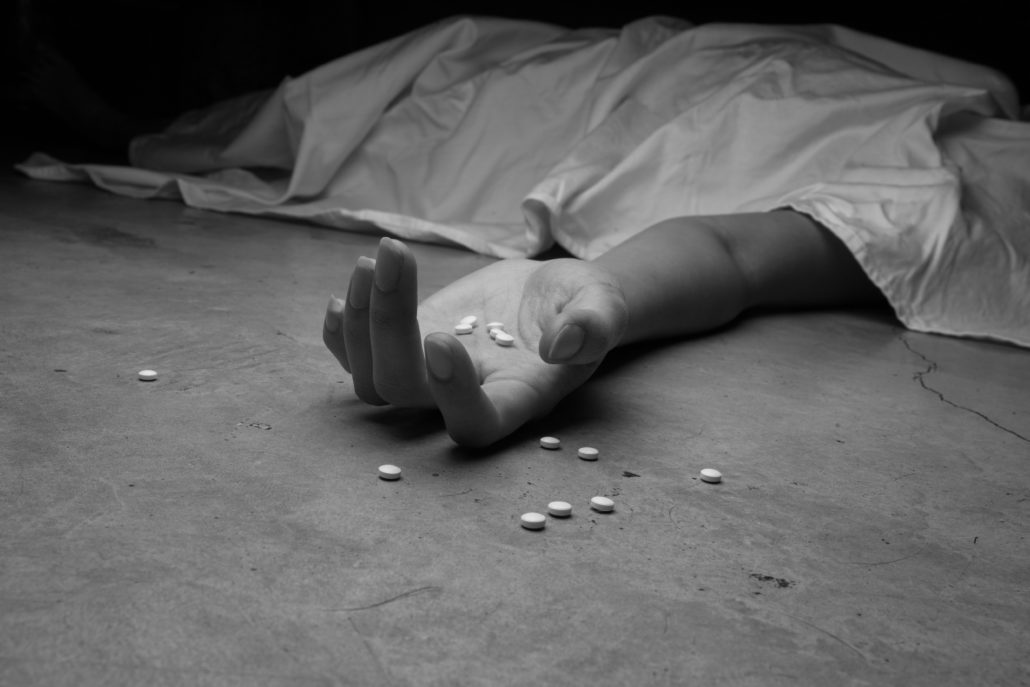Popular Street Names For Ketamine
Like its chemical cousin phencyclidine (PCP drug), ketamine’s psychomimetic effects have made it a popular recreational drug. In low doses, its euphoric and dissociative effects are sometimes referred to as “k-land.” In contrast, at high doses, the immobilizing and hallucinogenic effects are referred to as being in a “k-hole.”
In the context of an illegal recreational drug, ketamine street names are “K,” “vitamin K,” “super K,” “special K,” “super C,” “special LA coke,” “jet,” “superacid,” and “green.”
Ketamine abuse can cause various neurological, cardiovascular, psychiatric, urogenital, and abdominal symptoms that are dose-dependent, whether ketamine administration is in an iatrogenic or illicit context.
For example, some experts have attributed the higher incidence of ulcerative cystitis in recreational users to the adulterants with which the drug is mixed. Providers using ketamine should know the various mechanisms to treat ketamine toxicity and prevent acute complications such as rhabdomyolysis, seizures, chronic complications, psychiatric disturbances, and ulcerative cystitis.
Ketamine is a structural analog of the dissociative anesthetic and recreational drug phencyclidine (PCP). Originally called CI-581, ketamine has one-tenth the potency of PCP and causes less severe dysphoria and hallucinations. [1]
Intramuscular and intravenous ketamine is commonly used to provide pediatric anesthesia, especially for high-risk children or patients in limited-resource settings. In surgical settings, ketamine is typically combined with benzodiazepines, reducing the adverse psychological symptoms that occur during emergence. Off-label, subanesthetic doses of ketamine are also used for acute and chronic pain management, sedation, and severe depression treatment.
Get Help. Get Better. Get Your Life Back.
Searching for Accredited Dual Diagnosis Mental Health Centers Near You?
Even if therapy failed previously, or are in the middle of a difficult crisis, we stand ready to support you. Our trusted behavioral health specialists will not give up on you. When you feel ready or just want someone to speak to about counseling alternatives to change your life call us. Even if we cannot assist you, we will lead you to wherever you can get support. There is no obligation. Call our hotline today.
FREE 24/7 Dual Diagnosis Mental Health Services HotlineWhat is Ketamines Street Name?
what is the street name for ketamine? Ketamine is sold under the brand names Ketajet, Ketalar, Ketaset, and Ketavet. When used illegally, however, ketamine street names are Special K, Cat Valium, Kit Kat, K, Super Acid, Super K, Purple, Special La Coke, Jet, and Vitamin K.
Ketamine has the potential to cause physical and mental dependency and tolerance. Since the drug’s effects on the mental state are so strong, if addiction takes hold and a person uses it frequently, it might be simple to identify the condition. Today, ketamine remains a party drug, often used by high school students and young adults to achieve a hallucinatory, dream-like state.


End the Emotional Pain. Get Your Life Back.
Feeling Depressed, Anxious or Struggling with Mental Health Illness? Get Safe Comfortable Mental Health Dual Diagnosis High-Quality Therapy From Counselors That Care. Begin Your Recovery Now.
Hotline (855) 940-6125Ketamine Addiction
Ketamine abuse and toxicity can result from the medical use of parenteral or intranasal ketamine or the recreational misuse of ketamine, commonly through intravenous or intramuscular injection, insufflation (snorting), oral consumption, or smoking.
Ketamine-related emergency department visits often involved other drugs, with 71.5% of ketamine-related visits in the United States in 2011 involving alcohol (Drug Abuse Warning Network, 2011). The national survey-based Monitoring the Future Study in the United States reported that ketamine use decreased between 2012 and 2002, from 2.5% to 1.5% and 1.3% to 0.4%, among 12th graders and college students, respectively.
The World Drug Report in 2015 categorized ketamine as a worldwide recreational drug, with 58 countries reporting illicit use. However, ketamine misuse occurs on a relatively small scale, and PCP derivatives constituted only 1% of “new psychoactive substances” reported to the United Nations Office of Drugs and Crime in 2014 (fact file on ketamine). Ketamine misuse often occurs with other substances, including alcohol, amphetamines, MDMA, cocaine, and caffeine. [2]
n the United States, where ketamine has been classified as a C-III controlled substance since 1999, ketamine misuse has increased since the 1980s. However, compared to the surges in opioid addiction and illicit cannabis misuse, ketamine misuse has occurred relatively small.
First-class Facilities & Amenities
World-class High-Quality Mental Health Services & Behavioral Health Substance Abuse Treatment
Rehab Centers TourRenowned Mental Health Centers. Serene Private Facilities. Inpatient Rehab Programs Vary.
Mental Health Helpline (855) 940-6125Proven recovery success experience, backed by a Team w/ History of:
15+
Years of Unified Experience
100s
5-Star Reviews Across Our Centers
10K
Recovery Successes
- Comprehensive Dual-Diagnosis Treatment
- Complimentary Family & Alumni Programs
- Coaching, Recovery & Development Events
- Comfortable Onsite Medical Detox Center
Can You Get Addicted to Ketamine?
Yes. Ketamine works wonders for depression and fast and can be habit-forming. But it’s also addictive and potentially triggering for people in recovery. It’s proven to effectively treat severe depression that won’t respond to other medications. But because it affects so many receptor sites in the brain and causes hallucinations and other psychedelic effects, there’s much to consider.
Ketamine (ketamine hydrochloride) has been approved for general anesthesia alone or in combination with other medications. It is a superb drug for short-term medical procedures that do not require skeletal muscle relaxation. It approves the induction of general anesthesia as a pre-anesthetic to other general anesthetic agents.
It also has indications for supplementing low-potency agents such as nitrous oxide. Ketamine is used for short-term procedural sedation and rapid sequence intubation and is very useful in the emergency department setting for these conditions. It is the medication of choice for patients with bronchospasm because of its bronchodilatory properties. It can be utilized for procedures requiring short-term sedation/anesthesia, such as the reduction of fractures and dislocations, as well as in wound repair in uncooperative patients, especially children. It can be safely used in a wide age range, beginning at three months.
There is a wealth of evidence indicating the value of ketamine in treating severe pain, including conditions such as trauma, fractures, abdominal and flank pain, low back pain, and extremity pain. When used for pain management, sub-dissociative dosing, known as low-dose ketamine (LDK), is used alone or as an adjunct to other pain relief medications. It is safe and effective combined with injectable nonsteroidal pain medications and opioids. It has gained greater acceptance as concern has grown regarding opioid use. Clinicians are also using ketamine to treat patients with depression and suicidal ideation. It has been used recreationally as a drug of abuse. The street name for ketamine is “K” or “Special K.”
Ketamine is FDA approved for use in anesthesia and procedural sedation.

Ketamine Treatment for Opioid Addiction
Opioids are good painkillers, but many patients treated with opioids as painkillers develop a secondary addiction. These patients need to stop misusing opioids, but the mild-to-severe clinical symptoms associated with opioid withdrawal risk increasing their existing pain. In such cases, ketamine for opiate addiction, used by anesthetists and pain physicians to reduce opioid medication, may be an effective agent for managing opioid withdrawal. [4]
Ketamine Treatment for Drug Addiction
Does ketamine help with addiction? Yes. Ketamine is a dissociative anesthetic drug that acts on the central nervous system by antagonizing the n-methyl-d-aspartate (NMDA) receptor. Recently, ketamine therapy for addiction has attracted attention as a rapid-acting anti-depressant. Other studies have reported ketamine therapy addiction efficacy in reducing problematic alcohol and drug use.
Ketamine has effectively prolonged abstinence from alcohol and heroin in detoxified alcoholics and heroin-dependent individuals. Moreover, ketamine reduces the craving for and self-administration of cocaine in non-treatment-seeking cocaine users. However, further randomized controlled trials are urgently needed to confirm ketamine’s efficacy. Ketamine shows great promise as a treatment for various addictions, but well-controlled research is urgently needed. [5]
Ketamine for Depression
Is ketamine for depression addictive? Yes, it can be addictive. Depression is a serious mood disorder with symptoms that include prolonged periods of sadness, hopelessness, and irritability. The symptoms can affect how you feel, think, and handle daily activities. Depression is usually treated with medications, psychotherapy, or a combination. The FDA approved ketamine to treat depression. However, it should be medically monitored or under professional supervision as it has addiction risks itself. [6]
World-class, Accredited, 5-Star Reviewed, Effective Mental Health Dual Diagnosis Programs. Complete Integrated Inpatient Rehab with Free Post Discharge Therapy Planning.
CALL (855) 940-6125End the Emotional Pain Rollercoaster. Gain Stability & Happiness Through Recovery Treatment. Start Mental Health Counseling Today. Get Free No-obligation Guidance by Behaviroal Health Specialists Who Understand Mental Health Recovery.
How Addictive is Ketamine?
Ketamine is frequently used in medical settings to calm children who have experienced negative responses to other anesthetic drugs and in radiation and burn therapy. It is helpful when sedation is required, but heavier anesthetics would be too much. However, it has been rarely used in medical settings because of the possibility of misuse. It is more often utilized at veterinary clinics, and there are several instances where these offices have been stolen solely for their stock of ketamine.
Ketamine overdose symptoms are similar to PCP overdose, although the effects of ketamine tend to resolve more quickly. Physical signs and symptoms are dose-dependent through the loss of consciousness. Patients may be unable to provide a relevant history, and clinicians should seek pertinent clinical information from witnesses. Clinicians should also maintain familiarity with street names for ketamine.
The following symptoms may be present during ketamine use and intoxication:
- General – sedation, impaired consciousness
- Head, Ear, Eyes, Nose, Throat – horizontal, vertical or rotary nystagmus, mydriasis, excessive salivation
- Cardiovascular – hypertension, tachycardia, palpitations, arrhythmias, chest pain
- Abdominal – abdominal pain, abdominal tenderness, nausea, vomiting
- Neurological – altered mental status (disorientation), paranoia, dysphoria, anxiety, confusion, slurred speech, dizziness, ataxia, dysarthria, trismus, muscular rigidity, psychomotor, psychomimetic, or acute dystonic reactions
- Genitourinary – lower urinary tract symptoms
- Trauma – a thorough examination for evidence of trauma is needed as injuries secondary to ketamine intoxication can occur due to the diminished perception of pain.
Symptoms mostly unique to overdose, overly rapid infusion, or combined with other drugs include:
- Respiratory – respiratory depression, apnea
- Cardiovascular – hypotension, bradycardia, myocardial infarction
- Neurological – seizure, stupor, coma
Symptoms mostly unique to iatrogenic, intravenous delivery include:
- Respiratory – respiratory depression, laryngospasm
Ketamine Addiction Risk
The following are signs that you, or someone you know, maybe struggling with an addiction to ketamine.
Psychological ketamines addictive symptoms:
- Euphoria
- Distorted perception of reality, space, and time
- Floating/flying sensation
- Entering into a trance-like state
- Feeling detached from your body and surroundings, leading to an “out” of body experience or causing you to believe that you have died
- Depression
- Anxiety
- Fear, paranoia, and intense confusion
- Memory problems
- Auditory or visual hallucinations (hearing or seeing things that aren’t truly there)
- Inability to focus or concentrate
- Consuming ketamine to try and relieve stress; can often be the trigger for many people who go on to become addicted to ket
- Exacerbation of any existing mental health challenges

Behavioral and social symptoms of ketamine addiction:
- Using ketamine regularly in your day-to-day life and feeling as though you are unable to function without it
- Devoting an excessive amount of time to obtaining, using, and recovering from the effects of ketamine consumption
- Feeling as though you want to stop taking ketamine but finding that you are unable to
- Inability to stop thinking about when, where, and how you will get your next fix of ketamine
- Feeling as though ketamine has taken over your life
- Taking ketamine has become more important than hobbies or activities that you once enjoyed
- Continuing to take ketamine, even after experiencing negative consequences as a result of your ketamine abuse
- Mixing ketamine with other addictive drugs or alcohol
- Seeking out new ways to consume ketamine to experience a more intense ‘high’
- Being defensive, dishonest, and secretive about your ketamine use
- Withdrawing from loved ones leads to social isolation
- Finding that you only tend to socialize with people who take ketamine or other drugs
- People have noticed dramatic changes in your appearance or behavior as a result of your ketamine use
- Neglecting your responsibilities due to being high on ket
- Poor performance and attendance at work
- Stealing money or selling valuables to pay for ketamine
- Possession of paraphernalia related to injecting ketamine e.g. needles, syringes
- Engaging in risky and reckless behaviors when under the influence of ketamine
Physical ketamine addiction symptoms:
- Gradually building a tolerance to ketamine, meaning that you need to take higher doses of this drug and more frequently to experience the desired ‘high’
- Experiencing withdrawal symptoms if you stop taking or significantly reduce your ketamine use
- Scabs and bruises on the skin as a result of injecting ketamine
- Tiredness and fatigue
- Inability to feel pain
- Increased heart rate
- Breathing problems
- Co-ordination problems
Experience Transformative Recovery at the We Level Up Treatment Center.
See our authentic success stories. Get inspired. Get the help you deserve.



Start a New Life
Begin with a free call to a behavioral health treatment advisor. Learn more about our dual-diagnosis programs. The We Level Up treatment center network delivers recovery programs that vary by each treatment facility. Call to learn more.
- Personalized Care
- Caring Accountable Staff
- World-class Amenities
- Licensed & Accredited
- Renowned w/ 5-Star Reviews
We’ll Call You
Find Help For Ketamine Abuse Today
The We Level Up FL treatment center offers quality, effective ketamine addiction treatment to individuals who want to overcome their substance use disorders.
At our dual diagnosis treatment center, We Level Up FL can provide the highest quality of care in the beautiful tranquility of southeastern Florida. We recognize the intricacies of how mental and substance abuse disorders can influence others and sometimes result in a vicious cycle of addiction. That’s why we offer specialized treatment in dual-diagnosis cases to provide the greatest chance of healing from depression, anxiety, trauma, and long-lasting recovery from substance abuse.
We Level Up FL is a multi-faceted drug & alcohol treatment center in Florida that uses methods to generate practical solutions to major drug/alcohol challenges targeted toward families and individuals. We work to improve the health of the public and individuals from various angles. This includes constant research and innovation on substance abuse treatment models paired with individuals and a conducive environment.

An inpatient treatment center is designed to make the detox process as comfortable as possible and minimize all associated risks. Round-the-clock care and monitoring are provided to assist those with chronic symptoms and ensure the safety of every client. We Level Up FL have a luxury detox facility with everything necessary to achieve sobriety. This includes the most highly qualified and trained staff and various treatment options. Following a short stay in our detox and residential rehab program, We Level Up FL patients are ready and prepared for the next phase of their recovery journey.
The recovery process should be relatively smooth if you’re fortunate enough to survive ketamine toxicity and overdose. If you overdosed because you couldn’t stop using ketamine, now is the time to evaluate treatment options.
Are you worried your loved one is using a different ketamine street name to hide their addiction? Contact us today for a free personal, private consultation with one of our counselors 24/7.
FAQs
What are some street names for ketamine?
Various street names for ketamine include K, Special K, Vitamin K, super acid, super c, bump, cat Valium, green, honey oil, special la coke, and jet.
What is ketamine nickname?
Healthcare providers should be familiar with the street name ketamine. Popular ketamine nicknames are K, Special K, and vitamin K.
What is ketamine street name?
There are many different ketamine street names, including K, Special K, Super K, Kit Kat, Purple, and Bump.
Common street names for ketamine?
Ketamine is typically viewed as a “club drug” with hallucinogenic and dissociative effects. It goes by various street names ketamine, including “special k”, and “ket.”
Search for Ketamine Street Name & Other Resources
Sources:
[1-2] Orhurhu VJ, Vashisht R, Claus LE, et al. Ketamine Toxicity. [Updated 2022 Apr 4]. In: StatPearls [Internet]. Treasure Island (FL): StatPearls Publishing; 2022 Jan-. Available from: https://www.ncbi.nlm.nih.gov/books/NBK541087/
[3] Rosenbaum SB, Gupta V, Patel P, et al. Ketamine. [Updated 2022 Oct 10]. In: StatPearls [Internet]. Treasure Island (FL): StatPearls Publishing; 2022 Jan-. Available from: https://www.ncbi.nlm.nih.gov/books/NBK470357/
[4] Lalanne L, Nicot C, Lang JP, Bertschy G, Salvat E. Experience of the use of Ketamine to manage opioid withdrawal in an addicted woman: a case report. BMC Psychiatry. 2016 Nov 10;16(1):395. DOI: 10.1186/s12888-016-1112-2. PMID: 27832755; PMCID: PMC5105239. – https://www.ncbi.nlm.nih.gov/pmc/articles/PMC5105239/
[5] Ivan Ezquerra-Romano I, Lawn W, Krupitsky E, Morgan CJA. Ketamine for the treatment of addiction: Evidence and potential mechanisms. Neuropharmacology. 2018 Nov;142:72-82. DOI: 10.1016/j.neuropharm.2018.01.017. Epub 2018 Jan 12. PMID: 29339294. – https://pubmed.ncbi.nlm.nih.gov/29339294/
[6] How ketamine relieves symptoms of depression – National Institute of Health (NIH)
